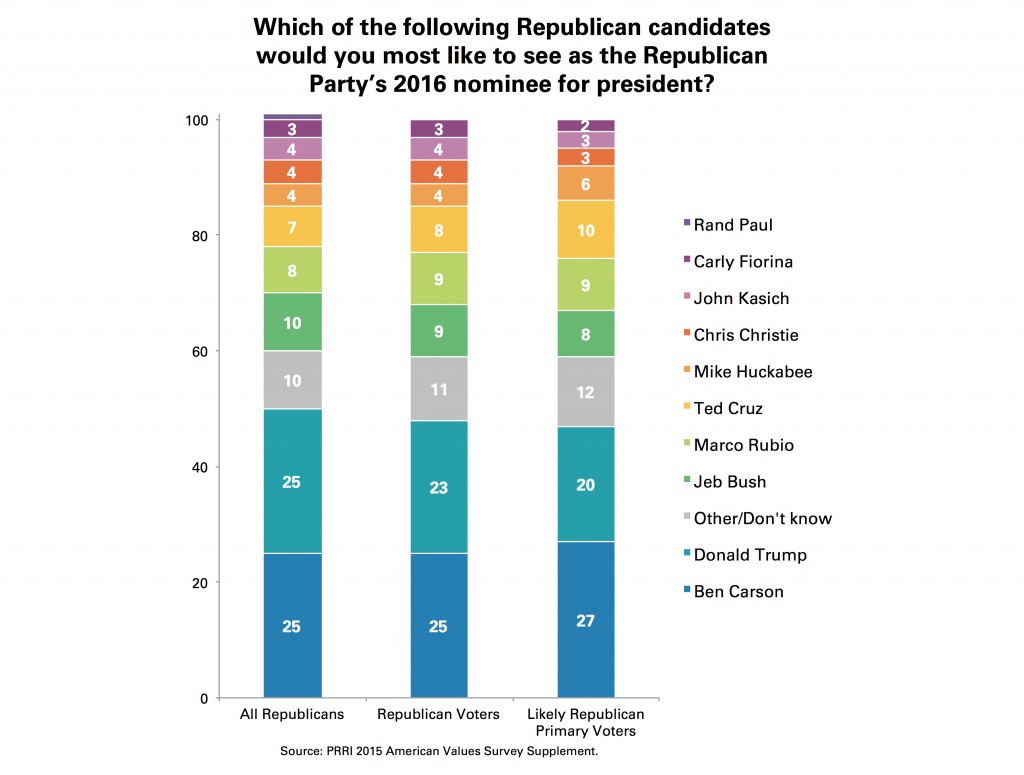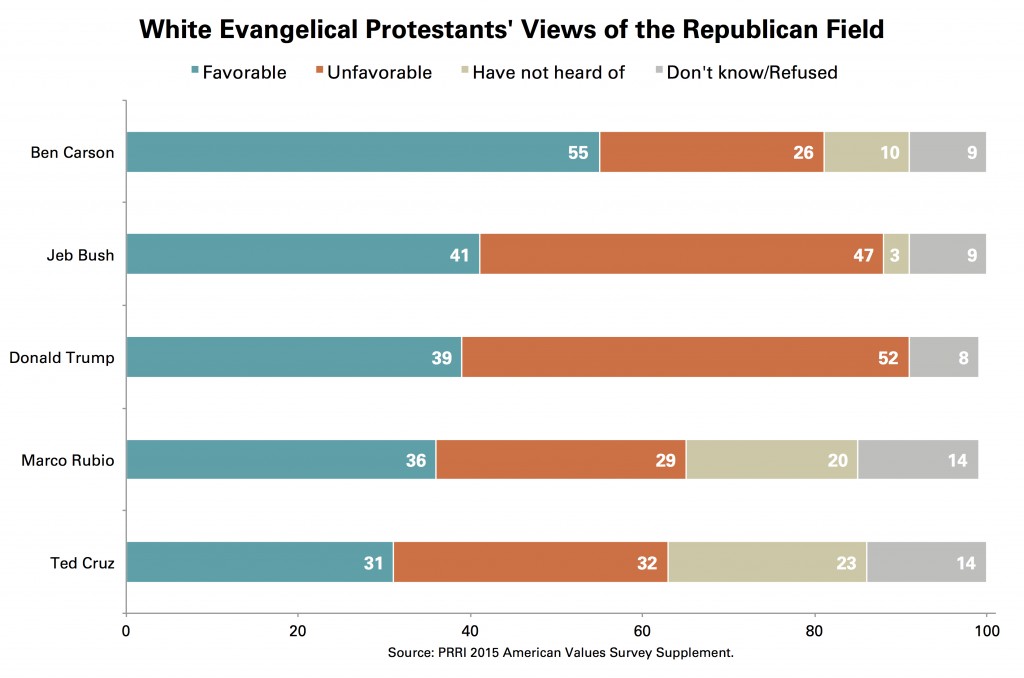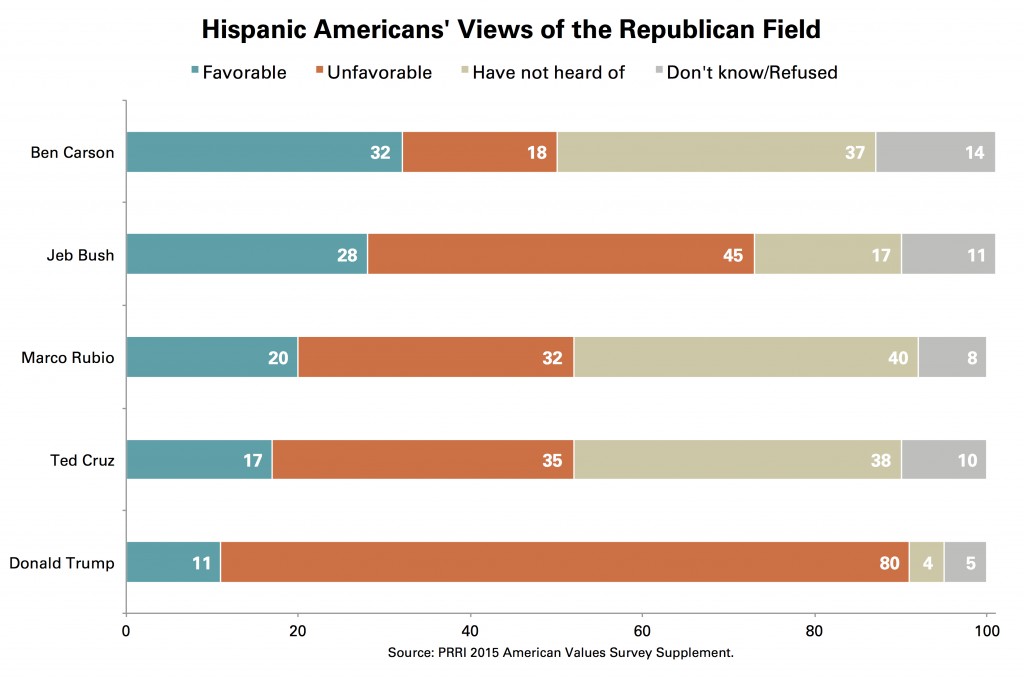American Values Survey 2015 Supplement
I. The 2016 Republican Primary
At this point in the GOP primary race, more than one in four (27%) likely Republican primary voters expresses support for Ben Carson’s candidacy. One in five (20%) likely primary voters say they would prefer Donald Trump to emerge as the party’s presidential candidate. Roughly one in ten Republican likely voters say they would like to see Ted Cruz (10%), Marco Rubio (9%), or Jeb Bush (8%) become the party’s standard-bearer. Fewer likely Republican voters support Mike Huckabee (6%), Chris Christie (3%), John Kasich (3%), or Carly Fiorina (2%). No likely Republican primary voters in the current survey say they would like to see Rand Paul become the party’s nominee.
Notably, among Republicans overall, Trump (25%) and Carson (25%) have equal support.
II. The 2016 Democratic Primary
Democratic hopeful Hillary Clinton retains a commanding lead over her primary opponents. More than six in ten (62%) Democratic likely primary voters support Clinton’s candidacy, while fewer than three in ten (29%) support Bernie Sanders. Only three percent of likely Democratic voters report that they would like to see Martin O’Malley become the Democratic nominee. Notably, candidate preferences do not differ appreciably between Democratic likely primary voters and Democrats overall.
III. Views of the Candidates
No Republican candidate is viewed more positively among Republicans than Ben Carson. Nearly seven in ten (69%) Republicans have a favorable view of Carson, while only 15% hold an unfavorable opinion of him; 16 percent of Republicans offer no opinion of Carson. Marco Rubio is also viewed quite positively among Republicans, with a majority (55%) expressing positive views of him and fewer than one in five (18%) registering a negative view. Notably, more than one-quarter (26%) of Republicans express no opinion of Rubio, suggesting that he is still not well known. Fewer than half (44%) of Republicans express a favorable opinion of Ted Cruz, while more than one-quarter (27%) say they have a negative opinion of him; however, 29% of Republicans say they have not heard of Cruz or offer no opinion of him.
Donald Trump and Jeb Bush are in remarkably similar positions in terms of how favorably they are viewed by their party. Both candidates are well known, and each has higher unfavorable numbers than other candidates in the race. A slim majority of Republicans have a favorable view of Trump (52%) and Bush (52%), while nearly four in ten say they view each candidate unfavorably (40% vs. 38%, respectively). Only approximately one in ten Republicans report being unfamiliar with Trump (8%) or Bush (11%).
Over the last month, views of the Republican candidates have shifted modestly. Trump and Bush have seen their standing among Republicans erode. Close to six in ten Republicans had a favorable view of Trump (58%) and Bush (56%) in early October, compared to slightly more than half by early November. Conversely, Rubio and Cruz have experienced a modest uptick in their personal favorability ratings. Half (50%) of Republicans reported a favorable view of Rubio in early October, while approximately four in ten (39%) expressed a favorable view of Cruz.
Carson elicits the most favorable views among a critical segment of the Republican electorate—white evangelical Protestants. A majority (55%) of white evangelical Protestants express a favorable view of Carson, while only about one in four (26%) view him unfavorably. White evangelicals are more ambivalent about Bush (41% favorable vs. 47% unfavorable), and hold more negative views of Trump (39% favorable vs. 52% unfavorable). More than three in ten white evangelical Protestants hold favorable views of Rubio (36%) and Cruz (31%), although their lower favorability numbers are impacted by the fact that significant numbers of white evangelical Protestants offer no opinion of Rubio (34%) and Cruz (37%).
Among another important segment of the electorate—Hispanic Americans—the Republican primary field remains largely undefined with an important exception. Eight in ten (80%) Hispanics have an unfavorable view of Trump, including nearly six in ten (59%) who say they view him very unfavorably. Hispanics are also more likely to hold an unfavorable (45%) than a favorable (28%) opinion of Bush, but more than one-quarter (28%) of Hispanics refuse to offer an opinion or say they have not heard enough about Bush to render a judgment. For most of the other Republican nominees, at least a plurality of Hispanics report having no opinion. Roughly half of Hispanics report being unfamiliar with Carson (51%), Rubio (48%), and Cruz (48%).
Clinton has a strong well of support among self-identified Democrats. The current Democratic front-runner elicits strong positive views, with nearly eight in ten (79%) expressing a favorable opinion of her. Fewer than one in five (17%) Democrats view Clinton negatively. That said, she is viewed favorably by only 25% of white evangelical Protestants. Majorities of Hispanic (64%) and black Americans (79%) hold favorable views of Clinton.
Read the full 2015 American Values Survey here.
Recommended citation:
Jones, Robert P., and Daniel Cox. “American Values Survey 2015 Supplement.” PRRI. 2015. http://www.prri.org/research/survey-american-values-survey-2015-supplemental/.








